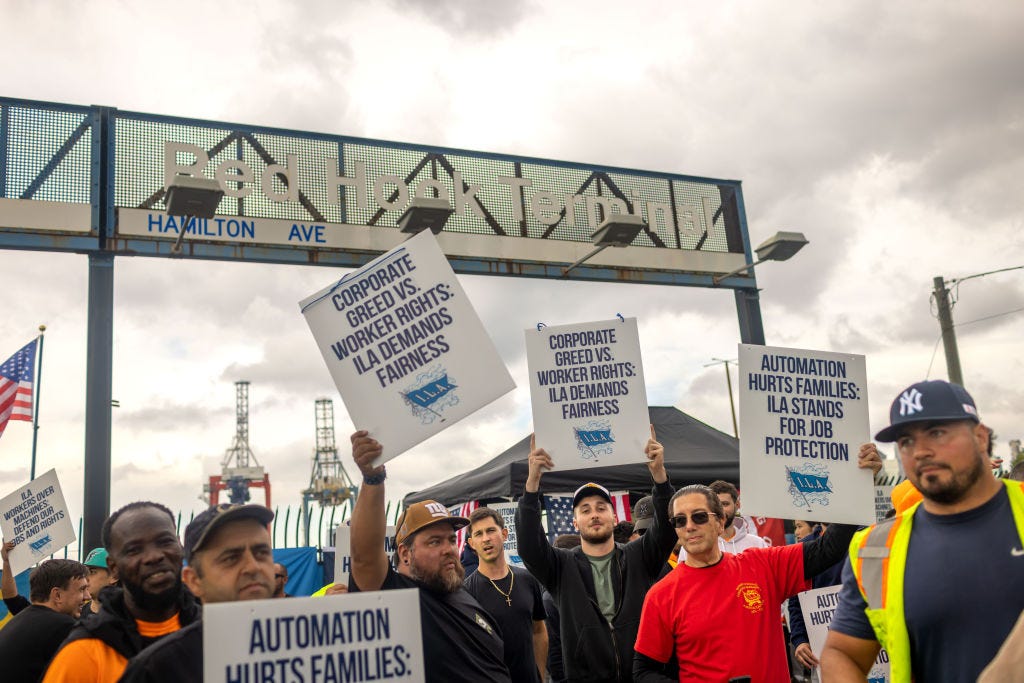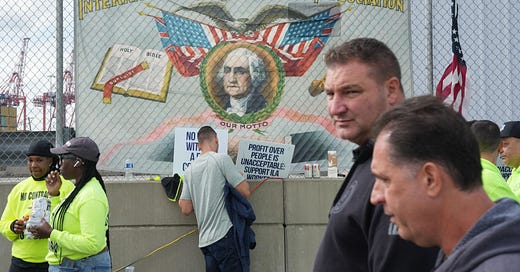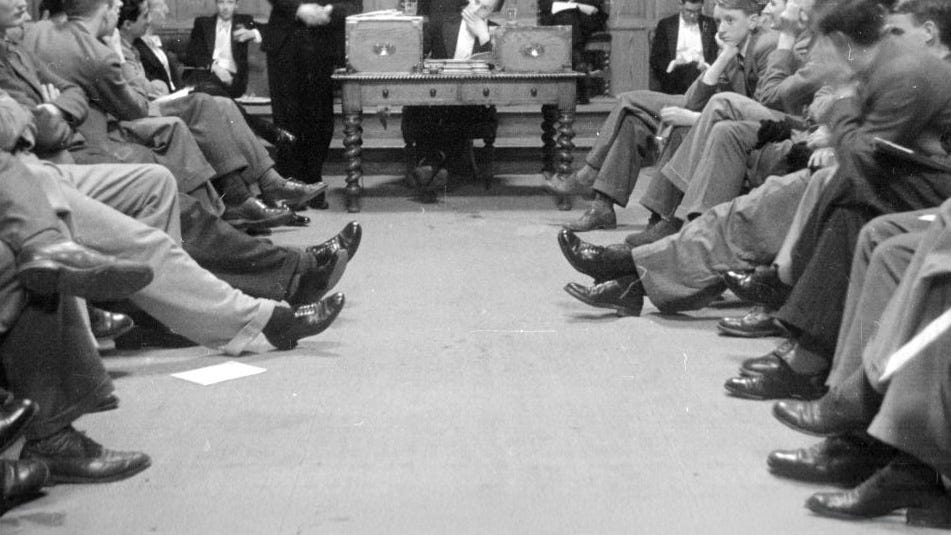
The Free Press

The International Longshoremen’s Association, whose strike is crippling U.S. ports from the Gulf Coast to New England, may not seem like the wretched of the Earth. They’re asking for a 77 percent pay increase on top of the $39 per hour those on the top tiers already make. The union’s president, Harold Daggett, earns $728,000 a year and once owned a 76-foot boat. With major disruptions looming, no wonder even some of those Americans ordinarily sympathetic to organized labor might be thinking, Okay, this is going too far. The less sympathetic are already calling for the Marines to suppress the strike.
But here’s the hard truth: The militancy showcased by the ILA is exactly what is needed to restore a fairer, more balanced economy—the kind that created the middle class in the postwar decades and allowed your grandparents to access reliable healthcare, take vacations, and enjoy disposable incomes. Those who complain that today’s left has come to privilege boutique identity politics over bread-and-butter concerns should cheer the longshoremen. There is nothing “woke” about their exercise of economic power to win material gains for themselves and their industrial brethren.
The longshoremen are striking for familiar reasons: better wages and benefits, and to prevent automation from decimating their livelihoods. As one worker told CBS: “We have it where you can get a 30-year mortgage in this country for a first-time homebuyer, but what happens when my six-year contract, when that comes to an end, and you say, I got automation taking your job—where does my mortgage go?”
Far from demanding the irrational, the ILA is doing what working people have always done when confronted with capitalism’s tendency to subject human beings to the rule of machines: Fight back. In the nineteenth century, factory owners insisted they couldn’t give workers a break or shorter workdays, lest machines fall idle. In response, working people in industrial countries organized to demand lunch breaks, shorter days, and an end to the employment of children.
More recently, employers have sought to eliminate the human factor altogether via robots and artificial intelligence. And once again, the organized sectors of the working class are counterpunching. Last year saw a successful campaign by the Screen Actors Guild to demand residual payments when performers’ voices and images are replicated by AI.
Some critics argue that the ILA’s demand that no automation take place at the ports is unreasonably rigid. It’s certainly audacious, but it’s called an opening gambit for a reason. I suspect we will see concessions on both sides leading to a reasonable settlement, as in the case of SAG. The rest—gripes about how much the ILA president earns or how longshoremen are already well-compensated—is the tired propaganda of the C-suite class.
Yes, this strike could be painful: for the shipping bosses, naturally, but also for the rest of us as consumers. But most consumers are also wage-earners and, as workers, we have lost a great deal of power since the mid-1970s. That’s when corporations teamed up with politicians of both parties to smash FDR’s New Deal. They replaced it with an order characterized by massive inequality, low wages, precarious service-based gigs, and Wall Street’s overweening control over the real economy.

The ILA strike is a rare reminder of working people’s power to shut it all down. And it was exactly such a hard-line approach that created the conditions for the New Deal in the early decades of the twentieth century. An instructive example comes from the 1930s, and happens to involve the same union.
In 1934, the ILA rank and file in San Francisco got fed up with the way foremen selected workers any given day at an early-morning hiring called the “shape-up.” As labor historian Philip Dray has written, “The system fostered nasty competition among individual longshoremen and inhibited their willingness to complain for fear of falling out of favor with those who ruled the daily selections.” The union leaders were dragged into a strike by militants inspired by an Australian radical named Harry Bridges. Soon, the uprising spread up and down the West Coast, and with the Teamsters joining in solidarity, the industrial action took on the character of a general strike.
Violence broke out when the local industrial association in San Francisco tried to bring in scabs, and National Guard troops were called in, with their commander threatening: “We have 4,000 additional men to back us up if necessary, and if that is not enough, we will call the national Army, the Navy, and the Marine Corps.” The media, meanwhile, denounced the action as a “Communist-led insurrection.” Why wouldn’t these knuckleheaded longshoremen and Teamsters do as the bosses ordered?
FDR’s government, however, declined to mobilize national troops, with Labor Secretary Frances Perkins, the first woman to serve in the role, later recollecting: “I thought it unwise to begin the Roosevelt administration by shooting it out with working people who were only exercising their rights. . . to organize and demand collective bargaining.” In the end, the strike collapsed on its own. The resulting hiring system wasn’t what the workers wanted—a union-run selection process—but the worst of the shape-up abuses were curtailed.
Real progress in market societies results from precisely this dynamic tension between labor and capital. For too long, however, one side of the equation—labor—has been torpid, not to say dormant. The asset-rich had it so good over the past few decades—capturing the lion’s share of the upside from de-unionization, financialization, and offshoring, as wages stagnated for the bottom half—that they all but forgot what labor militancy can look and sound like. How much it can sting.
Now, the labor movement is on the move. Since the pandemic, workers across a wide range of industries have joined arms to form new unions or to secure better wages and working conditions under existing collective-bargaining agreements. Last year, some 539,000 workers were involved in 470 strikes and walkouts, according to Cornell researchers, up from 140,000 workers mounting 279 strikes in 2021. This ferment—what one labor scholar has called a “strike wave”—comes after the union share of the private-economy workforce has declined from its peak of one-third in 1945 to 6 percent today.
Perhaps because Covid shone a cold light on our powerlessness relative to employers, 70 percent of Americans now approve of organized labor, according to the latest Gallup survey—the highest approval rate since 1965. The time is ripe for the working class to capitalize on this goodwill and reset the balance between labor and capital. If you’re shocked by how good the longshoremen have it compared to conditions in your industry, don’t get mad (at them)—organize.
For different perspectives on this topic read Noah Smith, who writes that “the working class needs automation and upskilling, not luddism,” and Lee Fang, who observes “deep problems with American organized labor.”
And, if you have thoughts to share, write to us at: Letters@TheFP.com.
Sohrab Ahmari is a founder and editor of Compact magazine and a contributing writer to The New Statesman. Follow him on X @SohrabAhmari and read his last Free Press essay, “Pseudo-Scholars and the Rise of the Barbarian Right.”
Become a Free Press subscriber today:














This is horrible. An article full of stinking thinking. Where do I apply to get my time spent reading ot back 😁
Why compare the number of strikes last year to 2021 - a year strongly influenced by the Covid pandemic?